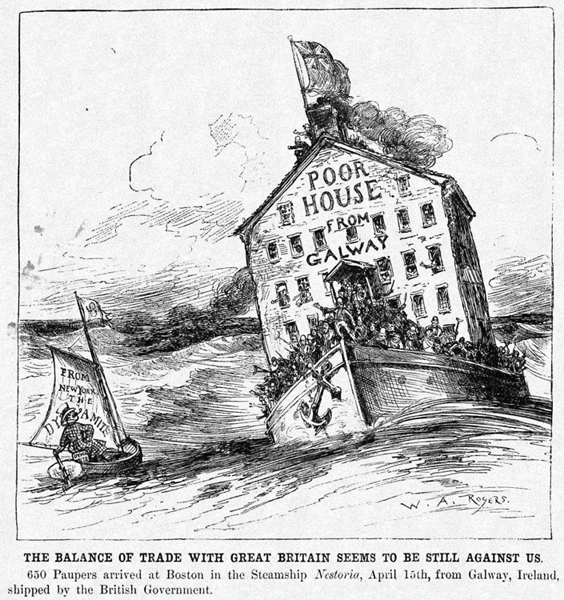Massachusetts
Studies Project
Teaching Tools for Local History:
** NEWS and CARTOONS **
 Introduction:
Newspapers, whether recent or historic, can be very useful teaching tools.
They can bring the past alive by adding a human dimension, historical context,
drama and a sense of immediacy to textbook accounts of events.
Introduction:
Newspapers, whether recent or historic, can be very useful teaching tools.
They can bring the past alive by adding a human dimension, historical context,
drama and a sense of immediacy to textbook accounts of events.
General Teaching Tips: Some topics are better suited than others for newspaper research. The best topics are those which can be connected to specific events, while the least suitable topics are those which show up not in events but in trends, long-term developments, or social movements.
Local political, government and military issues, public works projects, labor union strikes, natural disasters, eyewitness accounts of landmark events, local personalities, advertisements (including personal advertisements) are just some of the topics that can be readily researched in local and regional newspapers. In addition, political cartoons illustrating local social and political issues can be good sources for exploration and analysis. Commercial advertisements, classified and personal ads, social pages and obituaries are also fertile sources for local history research in newspapers.
As with any primary source, newspapers, broadsides and cartoons invite students to hone their critical thinking skills, to determine the objectivity and accuracy of a given source. In the case of newspapers, partisanship, boosterism and the possibility of heightened controversy for circulation reasons must all be considered as factors that influence the content and tone of the news.
Basic Questions
- What is the topic of the article or cartoon?
- Who wrote it (author/creator/artist)? What do you know about this author/creator? If the creator is unknown, are there clues to help identify him or her?
- How reliable is this article or cartoon for historical accuracy?
- What biases can writers, artists and others bring to their work?
- When was it created? If no date is listed, what clues are there that could help date it?
- Where was it written and where is the article or cartoon now found?
- Who was the intended audience?
Critical Thinking Questions
- What were the opinions, motivations, or interests of the creator? What did the creator hope to accomplish by creating this article or cartoon?
- Is the creator of this document deliberately anonymous? If so, what factors might have contributed to its being published anonymously?
- Did the creator wish to inform, persuade, or deceive his or her audience?
- How does the creator's point of view compare to other writers and artists of the period?
- What kind of impact would the artistic context of the era have on the content of the source?
- What questions would you like to address the author of this article or cartoon?
- For whom was the article or cartoon created?
- What sorts of information does the article or cartoon supply?
- What did you already know about the subject of this article or cartoon and how did this knowledge affect the way you viewed or read it?
- Can you trust the document's content at face value?
- What additional information is needed to help you understand the subject more fully?
Advertisements and Broadsides:
- What is being promoted by this ad or broadside?
- What information does this ad or broadside contain?
- Describe any claims of fact, reality or results the document makes.
- Who is the target reader?
- How has advocacy for this product changed over time?
- What social changes are reflected by changes in presentation of this product or issue?
Worksheet
"Cartoon Evaluation Worksheet" for
use with your local newspaper (from "Newspapers
in Education")
http://nieonline.com/cftc/pdfs/eval.pdf
"Poster (Broadside) Analysis Worksheet" National
Archives and Records Administration
http://www.archives.gov/education/lessons/worksheets/poster.html
Resources and Websites
"Massachusetts Newspapers" All online newspapers
linked by town.
http://www.abyznewslinks.com/unitema.htm
Massachusetts Newspapers on microfilm at
the Boston Public Library
http://www.bpl.org/research/microtext/news.htm
Online Newspaper Archives. Online newspaper
archives, digitized pages from selected newspapers from 1700's - 1900's;
essays related to newspapers and newspaper collecting.
http://www.historybuff.com/archives/tree.cgi
The American memory Project, Library of
Congress. The Continental Congress Broadside Collection and the Constitutional
Convention Broadside Collection contain 274 documents relating to the
work of Congress and the drafting and ratification of the Constitution.
(A "broadside" or "broadsheet" is an advertisement or public notice printed
on a large sheet of paper.)
http://memory.loc.gov/ammem/bdsds/bdsdhome.html
Model Lesson Materials
"History from the Headlines: Using Arizona
Newspapers to Teach History". Superb teaching guide. Practical advice
on how to locate and do research in historic newspapers, plus 4 in-depth
lessons that could used as guides for creating curriculum for use in Massachusetts.
http://www.ananews.com/ANANews/myarticles.asp?S=251&P=506128&PubID=2616&EC=0
The New York Times Learning Network: Offers
detailed lesson plans and quizzes built around NYT articles. Includes
Lesson Plan Archive and search capability by keyword, subject, or grade
level. Social studies lesson plans are objective and standard-based and
are well supported by charts, graphs, and images.
http://www.nytimes.com/learning/
"Spy Letters of the American Revolution:
Classroom Activities" Guidance in analyzing political drawings (Stamp
Act Funeral and Bostonians in Distress)
http://www.si.umich.edu/spies/index-stories.html
"NIE Online: Newspapers in Education"
Provides online lesson plans, quizzes, worksheets and other newspaper-oriented
resources materials for teachers.
http://nieonline.com/
"Cartoons for the Classroom" Newspapers in
Education. Archive of lesson plans and ready-to-use worksheets related
to modern political cartoons.
http://nieonline.com/niecftc/cftc.cfm?cftcfeature=archive
This
resource book was developed with support from
The Massachusetts Historical Records Advisory Board, Office of the Secretary
of the State
and
The Massachusetts Foundation for the Humanities